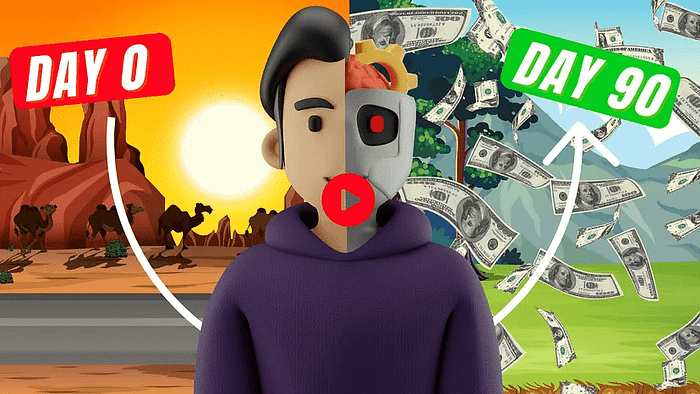5 Best App Builders For Beginners in 2025 (No-Code + AI)
Revolutionary app builders are transforming how we approach software development, making it possible for anyone with an innovative idea to create sophisticated applications without writing code. The convergence of artificial intelligence and no-code technology has created a new paradigm where complex development tasks that once required extensive programming knowledge can now be accomplished through intuitive interfaces and natural language commands. These powerful platforms are democratizing app development, enabling entrepreneurs, designers, and innovators to bring their digital solutions to life with unprecedented ease and efficiency.
We strongly recommend that you check out our guide on how to take advantage of AI in today’s passive income economy.
Table of Contents
Understanding Modern App Development Platforms
The evolution of app development has given rise to two distinct yet complementary approaches: no-code drag-and-drop app builders and AI-powered coding platforms. These modern app builders represent more than just development tools; they embody a fundamental shift in how we conceptualize and create software. By removing traditional coding barriers, these platforms are fostering a new generation of creators who can focus on solving problems rather than getting lost in technical complexities. The integration of artificial intelligence has further enhanced these platforms, enabling them to understand and implement complex requirements through simple natural language instructions.
1. Buzzy: Where AI Meets Design Innovation
Among the leading app builders in 2025, Buzzy stands as a testament to the power of combining artificial intelligence with intuitive design capabilities. This groundbreaking platform has revolutionized the app development process by creating a seamless environment where ideas can be transformed into functional applications through simple prompts and visual design tools. What sets Buzzy apart is its sophisticated AI engine that can interpret user requirements and automatically generate both the necessary database structures and user interfaces, making it an ideal choice for those who want to rapidly prototype and deploy applications.
The platform’s crowning achievement is its innovative Figma plugin integration, which has transformed how designers approach app development. This feature represents a paradigm shift in the design-to-development workflow, enabling designers to convert their meticulously crafted Figma designs directly into functional applications with automatic markup. The process is remarkably intuitive – designers can select their screens within Figma, activate the Buzzy plugin, and watch as their static designs transform into interactive applications complete with data models and functional components. This seamless integration bridges the traditional gap between design and development, significantly reducing the time and resources typically required for this transition.
Buzzy’s commitment to accessibility extends to its pricing structure, which has been carefully crafted to accommodate various user needs and scale requirements. The platform offers a comprehensive package starting at $50 monthly, which includes 7,000 tokens – sufficient for most small to medium-sized projects. Understanding the importance of trying before committing, Buzzy provides a generous 14-day free trial that gives users full access to explore its capabilities. For larger organizations and development teams, the AI Teams plan at $250 monthly offers enhanced features, improved collaboration tools, and increased token allowances. This tiered approach ensures that these powerful app builders remain accessible to individuals and teams of all sizes.
2. Softer: The Rise of No-Code Excellence
Softer has emerged as a dominant force in the no-code space, garnering significant attention and multiple Product Hunt accolades for its innovative approach to app development. This sophisticated front-end builder has redefined what’s possible in the realm of no-code development, enabling users to create complex web applications without writing a single line of code. The platform’s true strength lies in its versatility and ability to integrate with various data sources, including popular platforms like Airtable, HubSpot, and Google Sheets, making it an ideal solution for businesses looking to leverage their existing data infrastructure.
The platform’s interface has been meticulously designed around the concept of building blocks, making it extraordinarily accessible for users without technical backgrounds. This approach allows for the creation of sophisticated applications through an intuitive visual interface, where components can be assembled like digital Lego pieces. The recent introduction of REST API integration has further expanded the platform’s capabilities, enabling connections to a broader range of data sources and services. This advancement has positioned Softer as one of the most versatile app builders in the market, capable of handling everything from simple landing pages to complex business applications.
The landscape of app development continues to evolve rapidly, with app builders at the forefront of this transformation. As these platforms mature and incorporate more advanced AI capabilities, the distinction between no-code and AI-powered solutions begins to blur. This convergence promises an exciting future where the barriers to creating sophisticated applications continue to lower, enabling more individuals and organizations to participate in the digital revolution. The key to success lies not just in choosing the right platform, but in understanding how to leverage these powerful tools to create solutions that provide real value to users.
3. B.New: The AI Coding Revolution
B.New represents a quantum leap in AI-powered app builders, fundamentally changing how we approach application development through its innovative natural language processing capabilities. Unlike traditional development platforms, B.New enables users to construct sophisticated applications through conversational prompts, effectively removing the barrier between idea and implementation. This revolutionary approach has garnered significant attention in the development community, with users successfully creating applications valued at thousands of dollars in remarkably short timeframes.
What truly sets B.New apart from other app builders is its integrated deployment platform and comprehensive dependency management system. This integration eliminates one of the most common pain points in development – the complex process of managing libraries and deploying applications. Users can focus on their application’s functionality and design while B.New handles the technical intricacies of deployment and dependency management seamlessly in the background. This approach has proven particularly valuable for rapid prototyping and iterative development cycles.
The platform’s interface represents a masterclass in human-computer interaction, allowing users to build applications through natural conversation while maintaining precise control over the development process. B.New’s AI engine excels at interpreting user requirements and generating corresponding code, but it goes beyond simple code generation. The platform creates responsive designs that adapt beautifully across devices, implements complex features like user authentication, and handles database integration with remarkable efficiency. The ability to export projects and continue development in other environments adds another layer of flexibility, making B.New one of the most versatile app builders available.
4. Glide: The Business Solution Powerhouse
Glide has established itself as an indispensable tool in the business application development space, revolutionizing how organizations approach internal tool creation. This sophisticated platform has mastered the art of transforming ordinary spreadsheet data into polished, professional applications that can serve various business needs. With the recent integration of AI features, Glide has further cemented its position as one of the leading app builders for business solutions.
The platform’s expertise in creating business tools extends far beyond basic functionality. Glide excels in developing comprehensive solutions including customer portals, analytics dashboards, custom CRM systems, and sophisticated inventory management tools. What makes Glide particularly remarkable is its ability to maintain simplicity without sacrificing functionality. Users can create complex business applications with features like real-time data synchronization, user role management, and custom workflows, all without writing a single line of code.
Glide’s recent addition of AI agents represents a significant evolution in its capabilities. While currently in a controlled release phase, these AI agents promise to revolutionize how businesses approach app development. The system can now understand complex business requirements and suggest appropriate solutions, streamline workflow creation, and even optimize existing applications for better performance. This integration of AI technology positions Glide at the forefront of business-focused app builders.
5. Rept: The Future of Deployment and Development
Rept’s evolution from a deployment platform to a comprehensive development solution represents one of the most interesting trajectories in the app builders space. The platform’s unique background in deployment services has given it an unmatched understanding of the challenges developers face when moving from development to production. This expertise has informed the development of Rept agents, their revolutionary front-end building solution that combines the power of AI with battle-tested deployment capabilities.
The platform’s approach to development is distinctively methodical, incorporating AI-driven planning and implementation stages that ensure projects remain organized and efficient. Rept’s handling of complex backend operations, including authentication systems and database management, reflects its deep understanding of production-level requirements. This expertise makes it particularly valuable for projects that need robust backend functionality while maintaining an accessible front-end development experience.
Collaboration features in Rept deserve special mention among app builders. The platform has created an environment where team members can work together seamlessly, sharing resources and knowledge while maintaining clear version control. This collaborative approach, combined with its AI capabilities, makes Rept an excellent choice for teams working on complex projects that require multiple specialists.
Advanced Features and Considerations
When evaluating these app builders, it’s crucial to consider their advanced features and how they align with your project requirements. Each platform offers unique capabilities that can significantly impact your development process and final product. For instance, Buzzy’s Figma integration might be invaluable for design-focused teams, while B.New’s natural language processing could be perfect for rapid prototyping.
Security considerations have become increasingly important in app development, and these platforms have responded accordingly. Each offers various levels of security features, from basic authentication to advanced encryption and compliance tools. Understanding these security capabilities is crucial when selecting an app builder for your project, especially if you’re developing applications that will handle sensitive data.
The Future of App Development
The future of app builders lies in the continuing convergence of no-code and AI technologies. As these platforms evolve, we’re seeing increased integration of advanced features like machine learning, natural language processing, and automated testing capabilities. This evolution is making it possible for individuals and teams to create increasingly sophisticated applications with less technical overhead.
Making the Right Choice
Selecting the appropriate platform from these app builders requires careful consideration of various factors. For designers deeply embedded in the Figma ecosystem, Buzzy’s seamless integration offers an obvious advantage. Teams new to development might find Softer’s intuitive interface and comprehensive documentation more approachable. Those interested in pushing the boundaries of AI-driven development should explore B.New’s capabilities, while businesses focused on internal tools might find Glide’s specialized features more applicable.
The key to success with app builders extends beyond just selecting the right platform. Consider factors such as your team’s technical expertise, project requirements, scalability needs, and budget constraints. Each platform offers unique advantages, and understanding these in the context of your specific needs will help ensure a successful development journey.
Remember that the best app builders are those that align with your project goals while providing room for growth and adaptation. As these platforms continue to evolve and incorporate new technologies, they’re becoming increasingly powerful tools for turning innovative ideas into reality. The future of app development is becoming more accessible and sophisticated, and these platforms are leading the way in this transformation.
Performance Optimization and Scalability
When working with modern app builders, understanding performance optimization becomes crucial for long-term success. Each platform offers different approaches to handling increased user loads and data volume. Buzzy’s AI-driven optimization automatically adjusts resource allocation based on usage patterns, while Softer provides manual optimization controls for fine-tuning application performance. These capabilities make app builders increasingly viable for enterprise-level applications.
The scalability features of these platforms deserve special attention. B.New’s architecture supports automatic scaling through cloud infrastructure, handling thousands of concurrent users without performance degradation. Glide’s business-focused approach includes built-in load balancing and data caching mechanisms, ensuring smooth operation even during peak usage periods. Rept’s deployment expertise shines in this area, offering enterprise-grade scaling solutions that rival traditional development approaches.
Industry-Specific Applications
Healthcare Solutions
App builders have found significant traction in the healthcare sector. Organizations are using these platforms to create patient management systems, appointment scheduling applications, and health monitoring tools. Glide’s HIPAA-compliant features make it particularly suitable for healthcare applications, while B.New’s AI capabilities excel at creating sophisticated diagnostic support tools.
Education and E-Learning
The education sector has embraced app builders for creating custom learning management systems and educational tools. Softer’s intuitive interface makes it popular among educational institutions developing student portals and course management applications. Buzzy’s AI-powered features enable the creation of adaptive learning platforms that adjust to student performance.
Retail and E-Commerce
In the retail space, app builders are revolutionizing how businesses approach online commerce. B.New’s AI-driven development tools enable rapid creation of e-commerce platforms with sophisticated recommendation engines and inventory management systems. Glide’s business-focused features excel at creating point-of-sale systems and inventory tracking applications.
Integration Capabilities
Modern app development requires seamless integration with existing systems and third-party services. These app builders offer varying levels of integration capabilities:
API Integration
B.New leads in API integration capabilities, offering native support for RESTful APIs and GraphQL. This makes it possible to connect applications with virtually any external service or database. Softer’s recent API improvements have also made it more competitive in this space, offering visual tools for API configuration.
Database Connectivity
Glide excels in database connectivity, offering native support for popular databases and spreadsheet platforms. Rept’s sophisticated database handling capabilities make it ideal for applications requiring complex data relationships and real-time synchronization.
Security Considerations
In the current digital landscape, security cannot be an afterthought. These app builders incorporate various security measures:
Authentication Systems
Each platform offers different approaches to user authentication. B.New provides advanced authentication options including biometric authentication and multi-factor authentication. Glide’s role-based access control system offers granular permission management for business applications.
Data Protection
Buzzy implements end-to-end encryption for sensitive data, while Softer offers comprehensive data backup and recovery options. Rept’s security features include advanced logging and monitoring capabilities, essential for maintaining security compliance.
Cost Analysis and ROI
Understanding the total cost of ownership for applications built with these platforms is crucial for business planning:
Development Costs
While initial costs vary, app builders generally offer significant cost savings compared to traditional development. Buzzy’s AI-powered development can reduce development time by up to 80%, while Softer’s no-code approach eliminates the need for expensive development teams.
Maintenance and Updates
Long-term maintenance costs tend to be lower with app builders. Glide’s business tools include automatic updates and maintenance features, while Rept’s deployment platform handles infrastructure maintenance automatically.
Future Trends and Innovations
The future of app builders looks increasingly sophisticated, with several emerging trends:
AI-Powered Development
Artificial intelligence will play an even larger role in app development. B.New’s natural language processing capabilities are just the beginning, with future versions promising even more sophisticated code generation and optimization features.
Cross-Platform Capabilities
The ability to deploy applications across multiple platforms simultaneously is becoming increasingly important. Buzzy’s cross-platform capabilities are expanding, while Softer is developing new tools for native mobile app development.
Best Practices for Success
To maximize the benefits of using app builders, consider these best practices:
Planning and Requirements
Start with clear requirements and user stories. Even with AI-powered tools, proper planning remains crucial for success. Document your requirements thoroughly and use the planning features available in platforms like Rept.
Testing and Quality Assurance
Implement comprehensive testing procedures. While app builders handle many technical aspects automatically, thorough testing remains essential. Use built-in testing tools and consider third-party testing services for critical applications.
Conclusion
The landscape of app development continues to evolve rapidly, with app builders leading the charge in democratizing software development. Whether you’re a solo entrepreneur, small business owner, or enterprise developer, these platforms offer powerful tools for turning ideas into reality.
The key to success lies in choosing the right platform for your specific needs while understanding both its capabilities and limitations. As these tools continue to evolve, incorporating more AI features and advanced capabilities, they’re becoming increasingly powerful alternatives to traditional development approaches.
Remember that the best app builder is the one that aligns with your specific needs, technical capabilities, and business goals. Take advantage of free trials and starter plans to experiment with different platforms before making a final decision. The future of app development is becoming more accessible and sophisticated, and these platforms are at the forefront of this transformation.

We strongly recommend that you check out our guide on how to take advantage of AI in today’s passive income economy.




